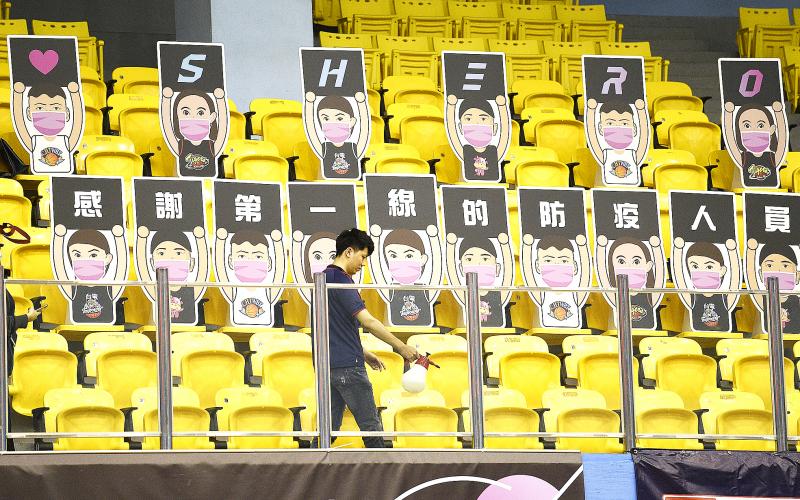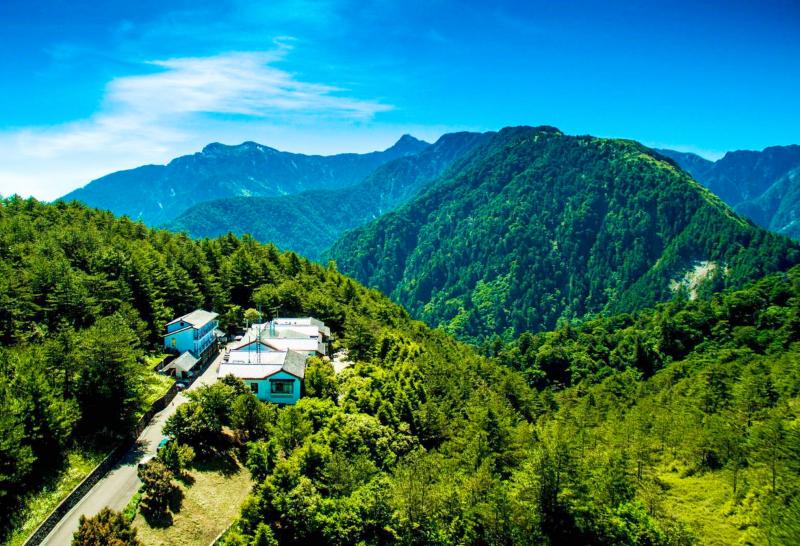Taiwanese in China’s Hubei Province are to be allowed to return to the nation on their own starting tomorrow, when the CPBL would be able to admit up to 1,000 spectators to baseball games, the Central Epidemic Command Center (CECC) said yesterday.
Minister of Health and Welfare Chen Shih-chung (陳時中), who heads of the center, said that Taiwanese in China’s Hubei Province, the epicenter of the COVID-19 pandemic, would not be required to take chartered flights or quasi-chartered flights from designated airports to return home.
The Chinese government imposed an unprecedented lockdown of Wuhan and other cities in Hubei on Jan. 23, leaving more than 1,000 Taiwanese, as well as their Chinese spouses and children, stranded in the province.

Photo: Chen Chih-chu, Taipei Times
The CECC in late February announced that the National Immigration Agency had marked the identification papers of the Taiwanese in Hubei, and that they would only be allowed to return on chartered flights.
Chen said the special markings would not be removed to allow immigration officers at airports to identify Taiwanese returning from Hubei, and that they would be required to stay at a centralized quarantine facility for 14 days before returning home.
Meanwhile, from tomorrow, up to 1,000 spectators would be able attend each CPBL game, he said.

Photo: Seanwen Yang, courtesy of the Yushan National Park Administrative Office
Deputy Minister of the Interior Chen Tsung-yen (陳宗彥), deputy head of the center, said that online reservations for lodges in national parks with mountains — including Yushan (玉山), Taroko (太魯閣) and Shei-Pa (雪霸) national parks — would be reopened today.
Chen announced that one new imported COVID-19 case (No. 439) was confirmed yesterday.
The case is a woman in her 30s, who had worked in the UK since January and returned to Taiwan on Apr. 26.
The woman reported that she had a stuffy nose and felt fatigued when she returned to Taiwan, so she received a COVID-19 test at the airport and was taken to a centralized quarantine facility, but was moved to a quarantine hotel the next day as the test came back negative, he said.
She continued to have a runny and stuffy nose, and developed an abnormal sense of taste during her stay at the hotel, so she was tested again on Monday and the result came back positive, Chen said.
CECC advisory specialist panel convener Chang Shan-chwen (張上淳) said that the woman thought she might have been experiencing menstrual fatigue on her trip back to Taiwan, so the center could not pinpoint when her COVID-19 symptoms began.
Applications for the Executive Yuan’s extended COVID-19 relief program — a one-time payment of NT$10,000 to workers not covered by social insurance programs — opened yesterday.
The center is grateful to officials at local district offices for handling the extra work, Chen said.
Those eligible are urged to not all apply on the first few days, as it would cause the offices to be overcrowded, he added.
The applications would be reviewed generously, promptly and in a way that is convenient to applicants, he said, adding that if people cannot provide documents to prove their eligibility, their application would most likely be accepted if they sign an affidavit.
About 99 percent of people who are not covered by any social insurance program and have very little savings should be trusted as long as they sign the affidavit, Chen said, adding that they would need to write a brief description of how their jobs have been affected by the pandemic.

Right-wing political scientist Laura Fernandez on Sunday won Costa Rica’s presidential election by a landslide, after promising to crack down on rising violence linked to the cocaine trade. Fernandez’s nearest rival, economist Alvaro Ramos, conceded defeat as results showed the ruling party far exceeding the threshold of 40 percent needed to avoid a runoff. With 94 percent of polling stations counted, the political heir of outgoing Costa Rican President Rodrigo Chaves had captured 48.3 percent of the vote compared with Ramos’ 33.4 percent, the Supreme Electoral Tribunal said. As soon as the first results were announced, members of Fernandez’s Sovereign People’s Party

EMERGING FIELDS: The Chinese president said that the two countries would explore cooperation in green technology, the digital economy and artificial intelligence Chinese President Xi Jinping (習近平) yesterday called for an “equal and orderly multipolar world” in the face of “unilateral bullying,” in an apparent jab at the US. Xi was speaking during talks in Beijing with Uruguayan President Yamandu Orsi, the first South American leader to visit China since US special forces captured then-Venezuelan president Nicolas Maduro last month — an operation that Beijing condemned as a violation of sovereignty. Orsi follows a slew of leaders to have visited China seeking to boost ties with the world’s second-largest economy to hedge against US President Donald Trump’s increasingly unpredictable administration. “The international situation is fraught

MORE RESPONSIBILITY: Draftees would be expected to fight alongside professional soldiers, likely requiring the transformation of some training brigades into combat units The armed forces are to start incorporating new conscripts into combined arms brigades this year to enhance combat readiness, the Executive Yuan’s latest policy report said. The new policy would affect Taiwanese men entering the military for their compulsory service, which was extended to one year under reforms by then-president Tsai Ing-wen (蔡英文) in 2022. The conscripts would be trained to operate machine guns, uncrewed aerial vehicles, anti-tank guided missile launchers and Stinger air defense systems, the report said, adding that the basic training would be lengthened to eight weeks. After basic training, conscripts would be sorted into infantry battalions that would take

GROWING AMBITIONS: The scale and tempo of the operations show that the Strait has become the core theater for China to expand its security interests, the report said Chinese military aircraft incursions around Taiwan have surged nearly 15-fold over the past five years, according to a report released yesterday by the Democratic Progressive Party’s (DPP) Department of China Affairs. Sorties in the Taiwan Strait were previously irregular, totaling 380 in 2020, but have since evolved into routine operations, the report showed. “This demonstrates that the Taiwan Strait has become both the starting point and testing ground for Beijing’s expansionist ambitions,” it said. Driven by military expansionism, China is systematically pursuing actions aimed at altering the regional “status quo,” the department said, adding that Taiwan represents the most critical link in China’s